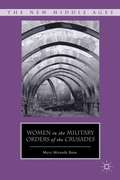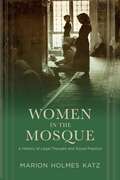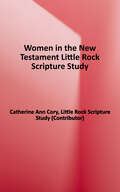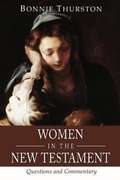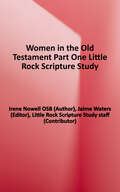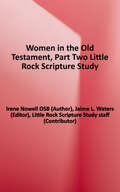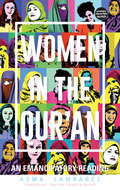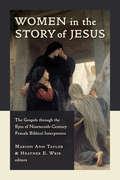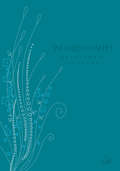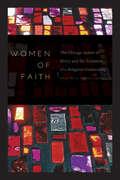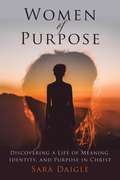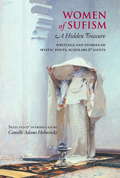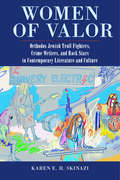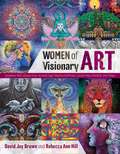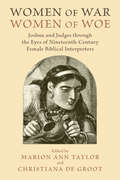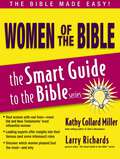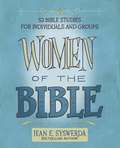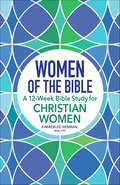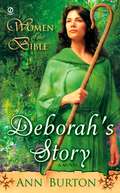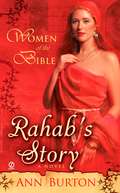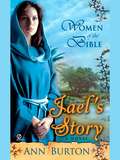- Table View
- List View
Women in the Military Orders of the Crusades
by Myra Miranda BomThis study of the female members of the Order or Hospital of Saint John of Jerusalem in the High Middle Ages analyses their presence in the context of female monasticism and compares their position to the position of women in other religious military orders. Introducing questions of gender into the history of the military orders.
Women in the Mosque
by Marion KatzJuxtaposes Muslim scholars' debates over women's attendance in mosques with historical descriptions of women's activities within Middle Eastern and North African mosques.
Women in the Mosque: A History of Legal Thought and Social Practice
by Marion KatzJuxtaposing Muslim scholars' debates over women's attendance in mosques with historical descriptions of women's activities within Middle Eastern and North African mosques, Marion Holmes Katz shows how over the centuries legal scholars' arguments have often reacted to rather than dictated Muslim women's behavior. Tracing Sunni legal positions on women in mosques from the second century of the Islamic calendar to the modern period, Katz connects shifts in scholarly terminology and argumentation to changing constructions of gender. Over time, assumptions about women's changing behavior through the lifecycle gave way to a global preoccupation with sexual temptation, which then became the central rationale for limits on women's mosque access. At the same time, travel narratives, biographical dictionaries, and religious polemics suggest that women's usage of mosque space often diverged in both timing and content from the ritual models constructed by scholars. Katz demonstrates both the concrete social and political implications of Islamic legal discourse and the autonomy of women's mosque-based activities. She also examines women's mosque access as a trope in Western travelers' narratives and the evolving significance of women's mosque attendance among different Islamic currents in the twentieth century.
Women in the New Testament (Little Rock Scripture Study)
by Catherine A. Cory"In Women in the New Testament, Catherine Cory delves into the lives of the women who befriended Jesus, were healed and transformed by him, followed him as disciples, and proclaimed the good news of his resurrection. Commentary, study and reflection questions, prayers, and access to online lectures are included—6 lessons" -- Provided by publisher.
Women in the New Testament: Questions and Commentary
by Bonnie ThurstonBonnie Thurston examines the personalities, place, and power of women in the New Testament. She provides a cultural and religious context for them by briefly outlining the position of women in the Greco-Roman world. The aim is to reveal the ways in which early Christianity attempted to liberate people from oppression (particularly patriarchy), as well as to point out the places and ways in which the early Christian community compromised with the dominant society.
Women in the Old Testament
by Irene T. NoelThe author describes each woman in the Old Testament and shows her scheme in salvation history.
Women in the Old Testament, Part One (Little Rock Scripture Study)
by Irene Nowell"Women in the Old Testament explores Israel's beginnings, Israel's captivity and freedom, and Israel's tribal period from the perspective of the earliest women of salvation history, such as Sarah, Deborah, Ruth, Judith, and Esther. Includes classic commentary by Irene Nowell, OSB and contemporary scholarship by Jaime Waters. Study and reflection questions, prayers, and access to online lectures also included"-- Provided by publisher.
Women in the Old Testament, Part Two (Little Rock Scripture Study)
by Irene Nowell Osb"Women in the Old Testament explores Israel's beginnings, Israel's captivity and freedom, and Israel's tribal period from the perspective of the earliest women of salvation history, such as Sarah, Deborah, Ruth, Judith, and Esther. Includes classic commentary by Irene Nowell, OSB, and contemporary scholarship by Jaime Waters. Study and reflection questions, prayers, and access to online lectures also included"-- Provided by publisher.
Women in the Qur'an: An Emancipatory Reading
by Asma LamrabetToday, the issue of Muslim women is held hostage between two perceptions: a conservative Islamic approach and a liberal Western approach. At the heart of this debate Muslim women are seeking to reclaim their right to speak in order to re-appropriate their own destinies, calling for the equality and liberation that is at the heart of the Qur'an. However, with few female commentators on the meaning of the Qur'an and an overreliance on the readings of the Qur'an compiled centuries ago this message is often lost. In this book Asma Lamrabet demands a rereading of the Qur'an by women that focuses on its spiritual and humanistic messages in order to alter the lived reality on the ground. By acknowledging the oppression of women, to different degrees, in social systems organized in the name of religion and also rejecting a perspective that seeks to promote Western values as the only means of liberating them, the author is able to define a new way. One in which their refusal to remain silent is an act of devotion and their demand for reform will lead to liberation. Asma Lamarbetis a pathologist in Avicenna Hospital, Rabat, Morocco. She is also an award-winning author of many articles and books tackling Islam and women's issues. Myriam Francois-Cerrahis a writer and broadcaster whose articles have been published in theGuardian,Salon, and elsewhere.
Women in the Story of Jesus: The Gospels through the Eyes of Nineteenth-Century Female Biblical Interpreters
by Heather Weir Marion Ann TaylorThis volume gathers the writings of thirty-one nineteenth-century women on the stories of women in the Gospels—Mary and Martha, Anna, the Samaritan woman at the well, Herodias and Salome, Mary Magdalene, and more. Retrieving and analyzing rarely read works by Christina Rossetti, Harriet Beecher Stowe, Elizabeth Wordsworth, and many others, Women in the Story of Jesus illuminates the biblical text, recovers a neglected chapter of reception history, and helps us understand and apply Scripture in our present context.
Women in the Story of Jesus: The Gospels through the Eyes of Nineteenth-Century Female Biblical Interpreters
by Heather Weir Marion Ann TaylorThis volume gathers the writings of thirty-one nineteenth-century women on the stories of women in the Gospels—Mary and Martha, Anna, the Samaritan woman at the well, Herodias and Salome, Mary Magdalene, and more. Retrieving and analyzing rarely read works by Christina Rossetti, Harriet Beecher Stowe, Elizabeth Wordsworth, and many others, Women in the Story of Jesus illuminates the biblical text, recovers a neglected chapter of reception history, and helps us understand and apply Scripture in our present context.
Women of Faith Devotional Journal (Women Of Faith Study Guide Ser.)
by Women Of FaithThe Women of Faith Devotional Journal is a thoughtful, inspirational tool that can be used as a stand-alone journal, or in conjunction with the Women of Faith Study Guide line and/or the Women of Faith Bible. Filled with stirring quotes and motivational Scripture verses, this journal is the perfect addition to any devotional time.
Women of Faith: The Chicago Sisters of Mercy and the Evolution of a Religious Community
by Mary Beth ConnollyWhen the Sisters of Mercy lost their foundress Sister Catherine McAuley in 1841, stories of Mother Catherine passed from one generation of sisters to the next. McAuley’s Rule and Constitutions along with her spiritual writings and correspondence communicated the Mercys’ founding charism. Each generation of Sisters of Mercy who succeeded her took these words and her spirit with them as they established new communities or foundations across the United States and around the world. In Women of Faith, Mary Beth Fraser Connolly traces the paths of the women who dedicated their lives to the Sisters of Mercy Chicago Regional Community, the first Congregation of Catholic Sisters in Chicago.More than the story of the institutions that defined the territory and ministries of the women of this Midwestern region, Women of Faith presents a history of the women who made this regional community, whether as foundresses of individual communities in Wisconsin, Iowa, and Illinois in the nineteenth and early twentieth centuries or as the teachers, nurses, and pastoral ministers who cared for and educated generations of Midwestern American Catholics. Though they had no immediate connection with McAuley, these women inherited her spirit and vision for religious life.Focusing on how the Chicago Mercys formed a community, lived their spiritual lives, and served within the institutional Catholic Church, this three-part perspective addresses community, spirituality, and ministry, providing a means by which we can trace the evolution of these women of faith as the world around them changed. The first part of this study focuses on the origins of the Sisters of Mercy in the Midwest from the founding of the Chicago South Side community in 1846 through the amalgamation and creation of the Chicago Province in 1929. The second part examines how the Mercys came together as one province through the changes of Vatican II from 1929 to the 1980s. Part III examines life after the dramatic changes of Vatican II in the 1990s and 2000s.Presenting rich examples of how faith cannot be separated from identity, Women of Faith provides an important new contribution to the scholarship that is shaping our collective understanding of women religious.
Women of Purpose: A Daily Devotional for Discovering a Meaningful Life in Christ
by Sara Daigle100 days of scripture-based devotions for an intentional and abundant life rooted in ChristWhy do some women seem deeply rooted in peace and joy—even in difficult circumstances—while others of us struggle daily with feelings of dissatisfaction, worthlessness, or anxiety? Being a Christian doesn’t mean we’re exempt from pain and suffering—but it does mean we are called to a higher purpose and can claim the gifts of the abundant life that Jesus promises.Sara Daigle is passionate about sharing a message of deliverance, freedom, and ultimate love with women from all places and walks of life. Her passion gave birth to this book composed in devotional form with a Bible verse and prayer for each day, focused on leading women out of the labyrinth of their own thoughts into a higher identity and value found in Christ.For those facing uncertainty and life changes, Sara reminds us that Jesus has “come to bring abundant life that doesn't end when one season flows into the next before you catch your breath.” For those who look around and see women who are prettier, more accomplished, better moms, or even “better” Christians than they are, we are shown that “There is no joy fuller than living out exactly what He's gifted us in without comparison to another.” Readers will resonate with Sara’s authentic voice, honesty about her own struggles, and the wisdom that comes through hard times and a rich relationship with God.This devotional is geared to bring even the busiest of women into daily intimacy with God. It is written to help each heart know they are not alone, but destined for a life of meaning, identity, and purpose in union with a Creator God who designed each of us just as we are.
Women of Sufism: A Hidden Treasure
by Camille Adams HelminskiThe luminous presence of women who follow the Sufi Way--the mystical path of Islam--is brought to life here through their sacred songs and poetry, their dreams and visions, and stories of their efforts as they witness the Truth in many realms. These writings reflect the honor and respect for the feminine in the Sufi worldview, and they are shared in the spirit of inspiration and hope for the flourishing contributions of women to the spiritual development of humanity. Spanning the centuries, from the time of the Prophet Muhammad to the present day, the selections are by or about an array of Sufi traditions in different parts of the world, from Asia, Africa, and the Middle East to Europe and America--from beloved members of the Prophet's family to the mystic Rabi'a al-Adawiyya to the modern scholar Annemarie Schimmel. Biographical anecdotes and personal memoirs provide a glimpse into the experience of great saints and contemporary practitioners alike, while providing an introduction to the principles and practices of Sufism.
Women of Valor: Orthodox Jewish Troll Fighters, Crime Writers, and Rock Stars in Contemporary Literature and Culture
by Karen E. SkinaziMedia portrayals of Orthodox Jewish women frequently depict powerless, silent individuals who are at best naive to live an Orthodox lifestyle, and who are at worst, coerced into it. Karen E. H. Skinazi delves beyond this stereotype in Women of Valor to identify a powerful tradition of feminist literary portrayals of Orthodox women, often created by Orthodox women themselves. She examines Orthodox women as they appear in memoirs, comics, novels, and movies, and speaks with the authors, filmmakers, and musicians who create these representations. Throughout the work, Skinazi threads lines from the poem “Eshes Chayil,” the Biblical description of an Orthodox “Woman of Valor.” This proverb unites Orthodoxy and feminism in a complex relationship, where Orthodox women continuously question, challenge, and negotiate Orthodox and feminist values. Ultimately, these women create paths that unite their work, passions, and families under the framework of an “Eshes Chayil,” a woman who situates religious conviction within her own power.
Women of Visionary Art
by David Jay Brown Rebecca Ann HillAn exploration of the role that dreaming, psychedelic experiences, and mystical visions play in visionary art • Includes discussions with 18 well-known female artists, including Josephine Wall, Allyson Grey, Amanda Sage, Martina Hoffmann, Penny Slinger, and Carolyn Mary Kleefeld • Reveals how they have all been inspired by deep inner experiences and seek to express non-ordinary visions of reality, reminiscent of shamanic trance states, lucid dreams, and spiritually transcendent experiences • Shows how visionary art often contains an abundance of feminine energy, helping us to heal ourselves and see that we are all connected Since early humans first painted from their mystic eye onto cave walls, artists have sought to share their sacred visions with the world. Created in every medium, from oil painting and sculpture to contemporary digital modeling, these visionary works of art give those who experience them a chance to “see the unseen,” realize wider modes of perception, and discover spiritual and mystical realms. In this full-color illustrated book, David Jay Brown and Rebecca Ann Hill examine the work and inspirations of eighteen of today’s leading female visionary artists, including Josephine Wall, Allyson Grey, Amanda Sage, Martina Hoffmann, Penny Slinger, and Carolyn Mary Kleefeld. They explore the creative process and the role that dreaming, psychedelic experiences, sexuality, and divine guidance play in the work of these women, alongside full-color examples of their art. They discuss the future of visionary art and reveal how these artists have all been informed and inspired by deep inner experiences and seek to express non-ordinary visions of reality, often reminiscent of those encountered in shamanic trance, lucid dreams, psychedelic states, spiritually transcendent experiences, and other altered states. Showing how visionary art often contains an abundance of feminine energy, helping us to heal ourselves and see that we are all connected, the authors explore with each artist what it is about being a woman that has most influenced their artwork. They also examine the connection between visionary art and spirituality, the influence of Nature and sacred geometry, and how this creative form is simultaneously ancient, futuristic, and timeless, providing an accessible doorway into the visionary realm.
Women of War, Women of Woe: Joshua and Judges through the Eyes of Nineteenth-Century Female Biblical Interpreters
by Marion Ann Taylor Christiana De GrootThe stories of such women as Rahab, Deborah, Jael, Delilah, Jephthah's daughter, and the Levite's concubine raised thorny questions for nineteenth-century female biblical interpreters. Could a Victorian woman use her intelligence to negotiate like Rahab? Was the seemingly well-educated Deborah an appropriate role model? Or did Jephthah's daughter more correctly model a pious woman's life as she submitted to her father's vow? This unique volume gathers select writings by thirty-five nineteenth-century women on the stories of several women in Joshua and Judges. Recovering and analyzing neglected works from Elizabeth Cady Stanton, Harriet Beecher Stowe, and many others, Women of War, Women of Woe illuminates the biblical text, recovers a neglected chapter of reception history, and helps us understand and apply Scripture in our present context.
Women of War, Women of Woe: Joshua and Judges through the Eyes of Nineteenth-Century Female Biblical Interpreters
by Marion Ann TaylorThe stories of such women as Rahab, Deborah, Jael, Delilah, Jephthah's daughter, and the Levite's concubine raised thorny questions for nineteenth-century female biblical interpreters. Could a Victorian woman use her intelligence to negotiate like Rahab? Was the seemingly well-educated Deborah an appropriate role model? Or did Jephthah's daughter more correctly model a pious woman's life as she submitted to her father's vow? This unique volume gathers select writings by thirty-five nineteenth-century women on the stories of several women in Joshua and Judges. Recovering and analyzing neglected works from Elizabeth Cady Stanton, Harriet Beecher Stowe, and many others, Women of War, Women of Woe illuminates the biblical text, recovers a neglected chapter of reception history, and helps us understand and apply Scripture in our present context.
Women of the Bible (The Smart Guide to the Bible Series)
by Kathy Collard MillerThe women of the Bible have a lot to say to women of today-how to live, how not to live, what choices to make, and why. The Smart Guide to the Bible: Women of the Bible introduces you to the Old and New Testament's most influential women, both young and old, shy and bold. Through their struggles and situations you'll discover the many blessings of being a wise and faithful woman of God.
Women of the Bible: 52 Bible Studies for Individuals and Groups
by Jean E. SyswerdaBased on the bestselling book coauthored with Ann Spangler, Women of the Bible, this study edition includes an introduction to each woman, major Scripture passages, study materials, and cultural backgrounds. There are fifty-two studies, one for each week of the year. Newly gathered study aids include helpful charts as well as a complete listing of all women of the Bible, with pertinent Scripture references. Space is included to record your thoughts and insights.Each timeless biblical story mirrors the challenges and changes today's women face. Through understanding these women's lives, this easy-to-use study resource will help you discover the God behind their stories—and yours.
Women of the Bible: A 12-Week Bible Study for Christian Women
by Kimberlee HermanLearn from the lives of Biblical women through 12 weeks of Bible study The Lord has called upon many women throughout Scripture—women from all walks of life who stepped up when He made them a part of His plans. This book highlights 12 of these women and the valuable lessons you can learn from their stories, inspiring you to persevere through tough times and listen when He calls you in your heart.What sets this book apart:12 weeks, 12 women—Find 12 weeklong study sessions, each focusing on the life of one woman from the Bible, including Rahab, Deborah, Mary of Bethany, and more.Readings and reflections—Apply the wisdom of these Biblical women to your own life with insightful commentary and thought-provoking questions to help you reflect on each day's passage from Scripture.Powerful lessons—Explore what each woman's unique experiences with the Lord can teach you about redemption, courage, and humility.See how God worked through the women of the Bible with this standout among Christian books for women.
Women of the Bible: A Novel
by Ann BurtonA lifelong slave, Deborah still dreams of a stranger destined to bring her joy. Then she meets Lappidoth, risking her life to save him. Later, as she recovers in his house, Deborah's dreams all come to pass-so she puts her gift to use. For she has dreamt: "The Lord will use a woman to defeat Sisera." And so will Deborah be known-as a heroine, a prophetess for God's chosen people, and one of the greatest judges of all time.
Women of the Bible: A Novel
by Ann BurtonThey were women of conviction and courage, whose stories inspire the faithful to this day. Here is Signet's second installment of Women of the Bible, a compelling new series for fans of historical romance and fiction. <P><P>Accused of witchery, Rahab is banished to certain death in Jericho. Now the girl once known as Beautiful Rahab must join the ranks of the city's prostitutes. She keeps her faith in God, but when Jewish spies appear, begging her to hide them, she must decide: stay safe and deny them-or help her fellow believers and transform herself from harlot to heroine.
Women of the Bible: A Novel (A Women of the Bible Novel)
by Ann BurtonThe third installment of Women of the Bible, a compelling series for fans of historical romance and fiction. Like most brides, Jael hopes for a loving marriage. But when Heber takes her home to his other women, her dreams crumble. The women warn Jael that to bear the sons Heber demands, she must risk shame, betrayal of her vows, even execution. But in this darkest moment, there sparks a flame-the young warrior Levi. <P><P>Jael is presented with a life-changing decision, one that will affect all the people of Israel. And there's no turning back on the path that will lead her to change history-by doing the unthinkable.
